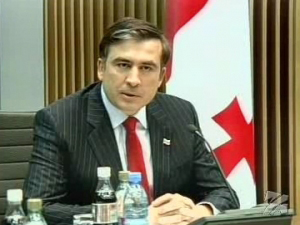In televised interview, Saakashvili defends Imedi decision, promises to do more to address poverty
By Ana Sulakvelidze
Tuesday, November 27

Recorded Saturday, the interview is the first aired with Saakashvili since he stepped down as the country’s president on
Sunday to begin his bid for reelection on January 5.
Grigolia questioned Saakashvili on most of the controversial episodes of the last few years.
Georgia has had a difficult time, Saakashvili acknowledged, but promised its challenges are all surmountable.
Confirming that he is willing to debate other presidential candidates, the National Movement leader asserted he can win the strong mandate he is looking for on January 5. If reelected, he said, his top priority would be addressing Georgia’s poverty.
“My goal is not only to keep my presidential post, but to execute the tasks that I consider to be important for Georgia.
These are to take the Georgian people out of poverty, to restore Georgia’s territorial integrity and to integrate into Europe,” Saakashvili told the interviewer, adding that the country can still gain membership to NATO.
Grigolia’s opened the interview by asking about the controversial November 7 raid on Imedi TV.
“Me and my colleagues could hardly imagine that special forces troops would burst into the TV station, and force my colleagues down to the ground at gunpoint,” Grigolia said, according to the online news source Civil.Ge. “Then they seized our mobile phones and let us out of the station premises. Then, outside the office, we were attacked again… Why?” Saakashvili replied that authorities were doing their job under “extremely difficult” conditions, but promised an “adequate reaction” from the government if any officers broke the law.
The shutdown of Imedi, he continued, was justified by the crisis of November 7. Blaming the events on tycoon and Imedi founder Badri Patarkatsishvili and his “machine of lies”—in reference to Imedi—Saakashvili argued that the station deliberately inflamed the situation by reporting that central Tbilisi’s landmark Sameba cathedral was under attack by riot police.
As anti-government protestors fled the area of Rike on November 7 ahead of advancing riot police firing tear gas and rubber bullets, some sought shelter in Sameba. There, according to Civil.Ge, an Imedi correspondent reported that “some people say they have seen riot police coming towards Sameba.”
Imedi was raided and forced off air soon afterwards; later that night, authorities declared a state of emergency and a media blackout.
On Sunday, the opposition coalition held a rally demanding that Imedi TV, which has had its broadcast license suspended for three months, be allowed back on air. There cannot be a fair election campaign, they say, with the station shutdown. Saakashvili declined to give a time that Imedi TV could resume broadcasts.
“[Imedi TV will be back on air] as soon as we see there is no danger of Patarkatsishvili trying to overthrow the government with his dirty tricks. When we have the legal framework guaranteeing this won’t happen, we will [allow Imedi TV to resume broadcasts],” he said.
Saakashvili promised that the turmoil of the last few weeks does not mean the country has slipped away from democratic ideals he espoused when coming to power as a young, American-backed liberal reformed in the bloodless 2003 Rose Revolution.
“I am a son of democracy,” he said. “I came into power through democratic debates and I am going to continue to govern this country through democratic methods. This means transparency, total freedom of media.”